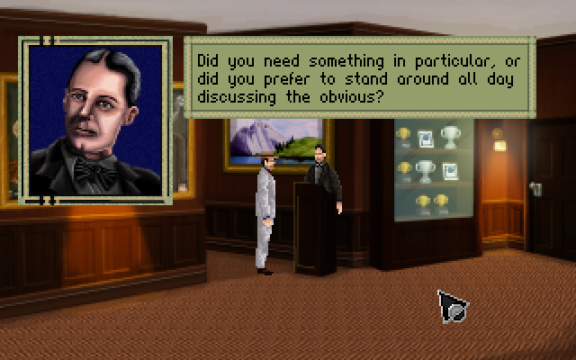
A Golden Wake
Written by: Rik
Date posted: September 20, 2019
- Genre: Adventure
- Developed by: Grundislav Games
- Published by: Wadjet Eye Games
- Year released: 2014
- Our score: 6
I’ve written before about how the indie adventure revival, in particular the work of Wadjet Eye Games, reignited my interest in the genre. After being late onto the scene, my discovery of the rather wonderful rabbi-based crime-solving caper The Shivah led me to the widely acclaimed Blackwell series, and the realisation that there’s a whole host of other adventures out there that I’d be excited to try.
A Golden Wake is published by Wadjet Eye but is actually the work of developer Francisco González (under the name Grundislav Games), who has previous links with the studio through his voice-over work, most memorably providing the deadpan delivery for recurring character Detective Sam Durkin. Prior to that, González was responsible for the Ben Jordan: Paranormal Investigator games, which shamefully (but not untypically) I’ve yet to experience for myself. And so of course, instead of starting at the beginning of that series, like a proper retro site, we’ve gone straight to Grundislav’s comparatively recent commercial debut.
A Golden Wake features what might traditionally be considered the distinctly unsexy pairing of a period setting and the world of real estate sales. You are Alfie Banks, a chipper young go-getter doing well in New York City at his late father’s agency, until circumstances contrive a move down to Florida. 1920s Miami is the main setting, and – as with the Blackwell games – fiction and history are mixed together here, with real life locations and characters being woven into Alfie’s tale throughout.
I must admit that the unconventional setting and subject matter was a little off-putting to me in the first instance, although clearly serious and/or historical approaches have been attempted before with some success (and, you know, it’s not like you have to have a genuine interest in pirates to enjoy Monkey Island). Plus, estate agents are generally (and in my experience, rightly) loathed, so the prospect of setting one up as your story’s hero doesn’t necessarily appeal. (Although the period setting arguably helps in this regard: I doubt a game based around the dealings of a modern-day property sales professional would be even remotely palatable, unless it was reconfigured as some kind of dark comedy).
Anyway, it’s the spirit of ambition, enterprise and entrepreneurship of the Florida property boom that this game attempts to channel, and it does so rather successfully. Stung by events in New York, Alfie dusts himself off and heads down to Miami for a piece of the action. Shamefully, I’m fairly ignorant of American history, and of the fact that Miami in the 1920s was a small place in the middle of what was essentially swampland, until a phase of rapid development during the period depicted here. It’s certainly an interesting setting (more than you might imagine) and the optional developer commentary includes lots of additional background from González, should you wish for any further detail during a second playthrough.
The segment in New York acts as a basic prologue and introduction, with the game proper beginning once Alfie arrives in Miami. Initial tasks are based around impressing local contacts and establishing yourself in the scene, specifically with those involved in the Coral Gables development, meeting real-life characters such as Edward “Doc” Danvers and George Merrick. Puzzles include sales-based mini-games, including a recurring persuasion sequence, which is used throughout the game whenever you need to, you know, persuade someone of something. Taking inspiration from the likes of L.A. Noire, you have to ascertain the motivations of each person from what they say, and try and select the appropriate response. It’s obviously a long way from the expensive face capture technology of Rockstar’s game, but arguably no better or worse in the slightly clumsy implementation. If you do fail, there is in most cases another solution, and so while it’s satisfying to get things right first time, you’re not forced to repeat these sequences to get the right answers and progress. There is also optional assistance in the form of so-called Seller’s Intuition, which performs an analysis of your target and their personality type.
Otherwise, it’s the usual adventure game stuff of performing errands: in this case, quite literally, as you’re given lists of tasks to accomplish by various characters and then go running around all over town like a dogsbody. In an interesting twist, this later becomes a bit of a sore point for Alfie, which is a novel bit of acknowledgement, even if it doesn’t quite change the facts of what you have to do in the game.
In general, A Golden Wake is in line with Blackwell in terms of approach and difficulty, although it arguably eases off on the latter even more, with progress through the story likely to be fairly zippy for most players. I’d say it was almost too zippy – although no fan of repetition and wandering between locations trying to work out what to do next, the approach here is not to linger on any puzzle or location for too long, and it almost feels as if you don’t quite get long enough to take everything in. Inventory management and use is fairly limited, and you can bet if you pick up an object, you’ll need to use it soon.
The interface is your basic AGS two-button system, with the left click used to interact with the environment and the right one to examine or look at things. With regard to the latter, although the game is otherwise fully voiced, environment descriptions are not, which seems like an odd omission. (It might have been equally odd for Alfie to think out loud, although thoughts can still be voiced without necessarily meaning that character is speaking: perhaps it’s a nod to the conventions of a more buttoned-up era).
Looks-wise, it’s got some nice touches, especially the backgrounds and some of the little bits of period detail, without being especially memorable, although again with a more straight-laced approach it’s perhaps harder for characters to leave a strong impression. The acting is generally top-notch, with Andy Chmelko as Alfie really capturing that try-hard preppy enthusiasm that the character needs, and you sort of like him and find him slightly annoying in equal measure. Elsewhere, there are some familiar voices from Blackwell, including a slightly iffy cameo from González himself later in the game. Oh, and the music – era-appropriate, of course – is really good, too.
Without giving too much away, there are various twists and turns in the story, with a number of leaps forward in time and developments that take place away from the eyes of the player. Along the way, Alfie takes some decisions that most would characterise as foolish, but in most cases you can sort of understand why he reacts the way he does even if you might not have made the same choice. (There is one exception where a turning point seems a little unconvincing, but I can’t really say which one without spoiling anything, so I won’t). I generally found it an interesting and enjoyable tale, from the bright and breezy opening to slightly more darker territory later on. The history and setting is interesting enough without laying it on too thick, and as previously mentioned, there’s extra detail in the commentary if you want it.
Although in many ways A Golden Wake isn’t all that similar to older adventure games – as we mentioned, it’s much less challenging and more focused on story, and less on puzzles – there’s a certain cheery naivety to proceedings that kind of reminds me of the spirit of earlier point and click capers. You can see it in the opening situation that causes Alfie to leave New York; in the way that your errands are literally given to you in a list; and in the solutions to some puzzles: at times, a bit contrived, unrealistic or game-y, but at the same time also quite endearing. Even though it’s based on a relatively straight topic, it doesn’t take itself too seriously.
Overall, though, I’m not sure it’s quite in the same league as the Wadjet Eye games that I’ve played. A direct comparison to Blackwell might be an unfair one, as it doesn’t really cover the same territory, but certainly the story isn’t quite as well-written or expertly delivered as the best of Dave Gilbert’s games. Plus, as previously mentioned, the pacing is a little too breezy and some of the core mechanics, including the persuasion mini-game, don’t always work that well. Still, judged on its own merits, A Golden Wake remains a solid and enjoyable effort that’s certainly well worth checking out, if you can overlook these reservations.

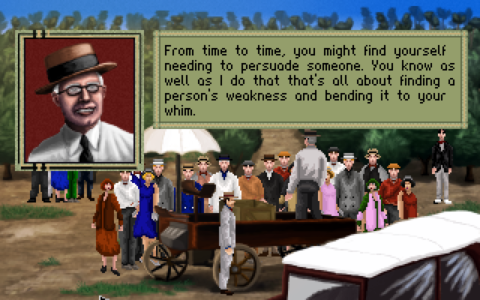
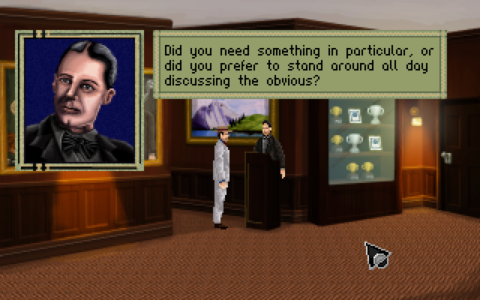
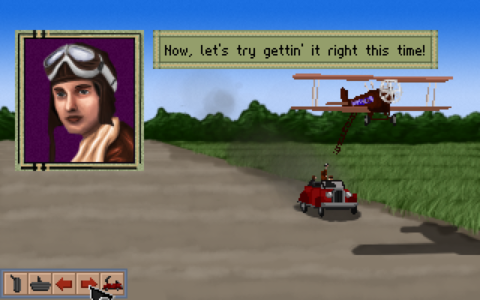
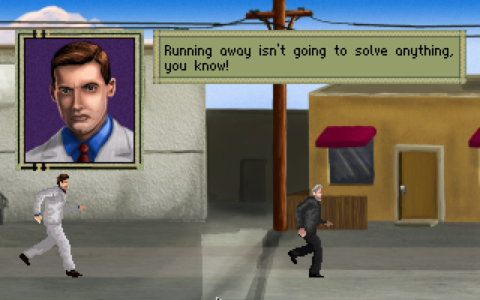

 Posts
Posts